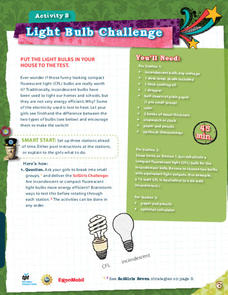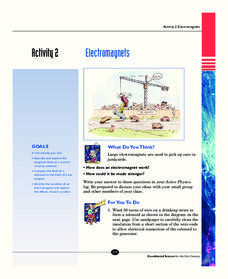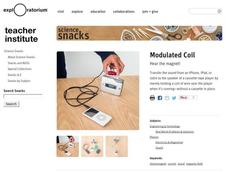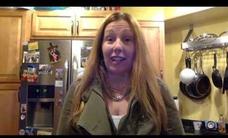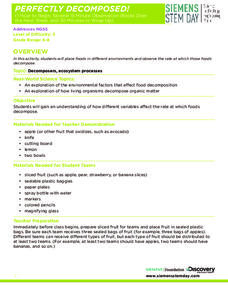PBS
Light Bulb Challenge
Efficiency equals money where homes are concerned. A comparative lesson asks learners to measure heat output of incandescent and compact fluorescent light bulbs. They follow their investigation with calculating the cost of using the two...
It's About Time
What Drives the Plates?
It's getting hot in here! Lead your emerging geoscientists on a thrilling journey as they calculate liquid densities to determine forces that stimulate thermal plates from within the earth's crust. They explore effects of temperature on...
It's About Time
Electromagnets
Young scientists build their own electromagnet and test it by picking up paperclips. Analysis questions evaluate knowledge at the end of the activity.
It's About Time
Center of Mass
Lead your class on an exploration as they locate the center of mass in several oddly shaped two-dimensional objects they create from their imaginations. Pupils also determine the location of the center of mass in three-dimensional...
Exploratorium
Modulated Coil
Transmit sound with an electromagnet. Class members follow the provided direction and build an electromagnet that will transmit sound though a cassette-tape player. As as extension they create an air core electromagnet and compare its...
It's About Time
How Do Earth's Orbital Variations Affect Climate?
How does Earth's orbit around the Sun affect climate? This third installment of a six-part series looks at how Earth's orbit affects the amount of insolation at locations on Earth involves different experiments used in conjunction...
Teach Engineering
Thirsty for Gold
In the last portion of the six-part unit, teams perform an experiment with gold nanoparticles to determine which sport drink has the most electrolytes. The nanoparticles are used as chemical sensors and fluoresce in different wavelengths...
PBS
Zip Line
Slide all the way to the bottom. Using the design process, pupils create a carrier for a ping pong ball that will travel down a zip line. Learners test their carriers and determine solutions to issues they encounter to complete the third...
University of Waikato
Melting Glacial Ice
There are many factors that affect how fast the glaciers are melting. A lab investigation has learners examine how the surrounding water affect the rate glaciers melt. They collect data from two samples of ice to determine how quickly...
DiscoverE
At Home: Keep a Cube Activity
Let cooler heads prevail. Future engineers first learn about heat transfer and insulation. They then design and build a contraption that will prevent an ice cube from melting for as long as possible.
PBS
Insulation Station
It's all about the material. Learners experiment with different substances as they try to keep an ice cube from melting. They draw conclusions by answering a set of questions about the types and amount of material that had the best result.
Teach Engineering
Investigating the Properties of Plastic and its Effects on the Environment
Pore over the properties of plastic. Working through four different stations, pupils investigate some properties of plastic, including chemical decomposition, mechanical breakdown, density, and the ability to infiltrate the food chain....
Bonneville
How to Build a Turbine
Here is a six-minute video of a pair of electrical engineers that illustrate how to build a wind turbine. A list of materials is provided, along with general guidelines for your class. Use this to introduce turbine design to your...
American Museum of Natural History
Light Quest
Grab a partner and shed some light on light. A remote learning resource has scholars play a board game to answer trivia questions about light. They also read about how Einstein contributed to the understanding of light as both a wave and...
It's About Time
How Atoms Interact with Each Other
Connect the dots and assist young chemists as they demonstrate covalent and ionic bonding. Class members use their knowledge of valence electrons to predict compound formulas as they arrange electrons into various bonding structures to...
It's About Time
How Electrons Determine Chemical Behaviors
Lead the class on an investigation as they play detective and locate patterns in the electron arrangement of atoms. During the seventh lesson, they assign valence numbers to elements, organize the periodic table in the correct sequence,...
NOAA
I Didn’t Do It…Did I?: Make Your Own Greenhouse Effect
How do greenhouse gases affect the climate on Earth? Pupils explore the concept by first building their own apparatuses to model the greenhouse effect. Then, they record data to measure temperature change and determine that the amount...
NOAA
Communicate!: Create a Unique Message About Climate Change
Scholars use their communication skills to express their take on climate change in the ninth installment of the 10-part Discover Your Changing World series. They create ways to deliver their messages on a specific aspect of climate by...
Curated OER
Exploring the Water Cycle
The water cycle is one of earth's most easily observable processes, but demonstrating each step within classroom walls can be a challenge. Through a series of videos and quick demonstrations, cover each aspect of the hydrologic cycle in...
Discovery Education
Perfectly Decomposed!
We all know someone who won't eat the banana with a brown spot, the grape with a dimple, and the apple with a bruise. Scholars use different fruits to explore what happens when fruits really start to decompose. They set up an experiment...
Discovery Education
Motion in the Ocean
How do temperature changes affect ocean currents? Scholars explore convection currents by demonstrating the flow of water in a baking dish. They use ice, heat, and food coloring to see currents. Then, they draw conclusions about their...
American Museum of Natural History
Be a Water Saver
Everyone must do their part to make a difference. The lesson link provides an 11-item questionnaire to reflect on conservation practices. Simple and straightforward, the lesson is perfect as a remote learning resource or as a tool for an...
Curated OER
Cell City Project - You are the Designer!
How can something as large as a city and as small as a cell have anything in common? That is exactly the question young scientists explore with this engaging life science project. Choosing to focus on a city, school, factory, or other...
It's About Time
Photosynthesis, Respiration, and the Carbon Cycle
Provide your class with the opportunity to view our carbon cycle close up. Young scientists research the cycle of oxygen as it completes the tasks of photosynthesis and respiration. They explore the importance of carbon in an ecosystem...
Other popular searches
- Potential and Kinetic Energy
- Energy Pyramid
- Renewable Energy
- Energy Transformation
- Forms of Energy
- Kinetic Energy
- Energy Transfer
- Thermal Energy
- Heat Energy
- Solar Energy
- Solar Power
- Potential Energy


